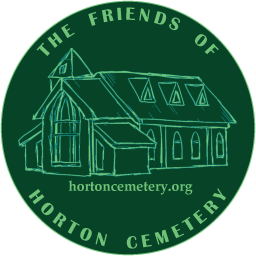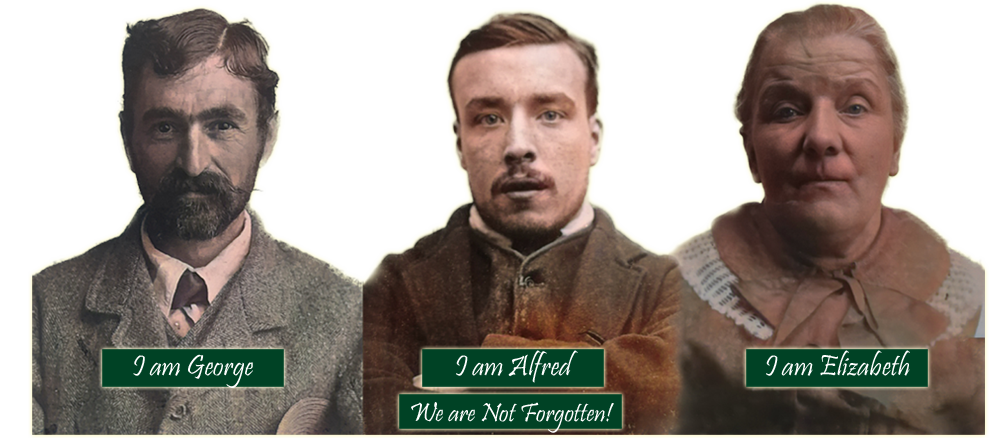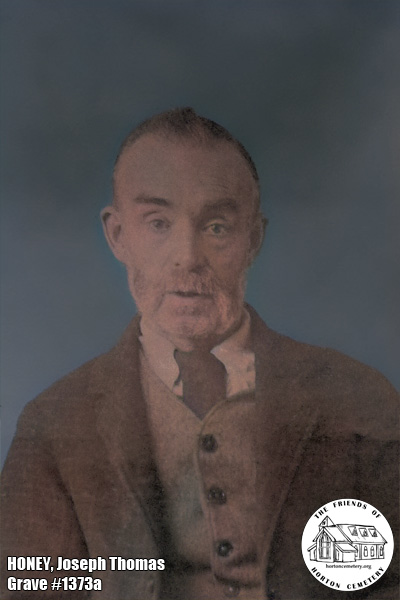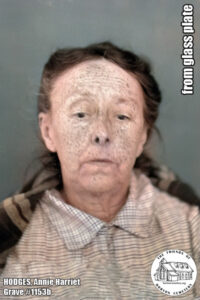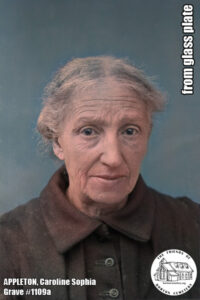b.1843 – d.1912
Early Life
Joseph Thomas was the fifth of seven children born to Joseph Honey (1804-81) and
Margery Couch (1811-66) who were both born in Cornwall and married in St.
Mewan’s church on 28th July 1832.
Their children are;
- Frances Couch Honey 1833-1912
- John Couch “ 1836-1891
- Maria Couch “ 1839-1913
- Margery Couch “ 1841-1947
- Joseph Thomas “ 1843-1912 * no Couch
- Amelia Jane Couch “ 1846-1910
- Mahala Elizabeth Couch “ 1849-1921
All were baptised in St Mewan’s Church including Joseph Thomas on 19th March 1843 when the family address is “Sticker”, St.Mewan and his father is a “Yeoman”.
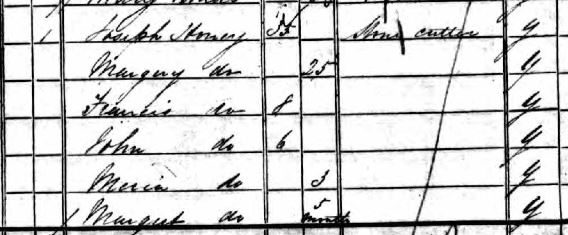
In the 1841c Joseph Snr., shown as a ‘stone cutter’ and his wife Margery have four children; Francis, John, Maria and Margret.
By the time of the 1851c Joseph and Margery have completed their family and moved to Paddington, London, where we find ‘Mary’ Margery and her children living at 6, Johnsons Place, Paddington, Middlesex.
Joseph snr however, appears to be lodging in ‘Maker’ part of the ecclesiastical district of Exeter which is listed as Cornwall. Joseph’s occupation is given as ‘stone mason’. We may speculate that work in London had been hard to come by and he had returned to an area he knew to find a job; however, with the railway building boom in the 1850’s there may be a different story behind the division of the family.
1860s/70s
By 1861 they are reunited and living at 21 Victoria Street, Paddington, Joseph snr is now shown as a ‘gardener’ and young Joseph Thomas is a ‘clerk’ the other three girls still living at home are, ‘mantel makers’.
On 1st May 1869 Joseph Thomas Honey married Eliza Wood (1847-1939) at St Mary’s Church, Lambeth. They are both shown as living in the High Street.

Eliza Wood was probably born on 8th Sept 1847 but was not baptised until 9th Dec 1854 at St George the Martyr, Southwark when her parents, William and Elizabeth are living in Bermondsey, Williams occupation is given as “traveller.” At a later date Elizabeth gives her religion as Baptist which may account for the delay in baptism. On her marriage cert Eliza’s father is given as William John Wood, gas fitter.
The birth of Joseph Thomas and Eliza’s only child William George, is registered in the 3rd Quarter of 1868 under the name of Wood, he is not baptised until 5th April 1882 aged 13yrs when the register names him as William George Honey. At this time they are living at 27, Lower Woolwich Row, Greenwich, Kent.

There is a possible sighting of Joseph in the 1871c lodging in Plymouth, he says he is married, a carpenter from Lewin (Mewan) Cornwall so it seems possible that, like his father he returned to Cornwall to find work but we cannot be sure. I have found no signs of any of the family in the 1881c.
The workhouse


On the 18th August, 1890 Joseph is admitted to the Lewisham High Street Work House due to ‘illness”. We suspect that this was early signs of Joseph’s Epilepsy as on the 1911c it states that he has been epileptic since the age of 51yrs.
The work house is just down the road from the address given in the 1891c when Joseph and Eliza are living alone at 2, Mercy Terrace, Ladywell Road, Lewisham and he is described as a ‘journeyman carpenter’ so we can presume that he has recovered enough to return home. Ladywell Road in on the outskirts of the developing area of Lewisham but is still quite rural.
We have no record of Joseph’s whereabouts in 1901 but we know that Joseph was in and out of the Lewisham Infirmary from about 1891 but moved to Cane Hill Asylum at some point. Despite extensive searching I cannot place him in either place.
In 1901c we find Eliza Honey, she boarding with the Bird family at 37, Walpole Rd, Bromley when she say’s she is married and give her occupation as ‘laundress’.
The Ewell Epileptic Colony
On the 23rd June 1904 we find Joseph, aged 60yrs being transferred from Cane Hill Asylum, Coulsdon, Surrey, to The Epileptic Colony, Ewell, Surrey. No recorded can be found of his time at Cane Hill and it is thought that all records were destroyed.

On admission to the Colony Joseph’s wife, Elizabeth, is living at 48, Beacon Rd, Hither Green, Lewisham, she says that they have been married for 35yrs and have just the one child who is 27yrs old.
His parents were “good, sober people” and his own alcohol consumption is “nothing to speak of”. Although later in the same notes Joseph states that he was a “heavy drinker of ale outside.”
He has been in the Cane hill asylum for the past 9yrs following his first Epileptic attack aged 51yrs.
The doctor’s notes state that he “partakes of the nature of recurring attacks of Hypochondriasis (severe worry, anxiety of being ill) and delusions of persecution in connection with fits”.
The doctor observes that Joseph is “restless and excited and he talks with imaginary persons. He sees angels night and day.” Apparently these angels fill him with morbid and dangerous thoughts.
The attendant from Lewisham Infirmary states that, “He is at times violent and strikes those around him as they prevent him from going to heaven.”
His wife says that, “He is losing his memory, he says he can see heaven and hell and angels and he can hear singing, bells, talking and music playing”
Poor Joseph was obviously in a very distressed state.
His general bodily health is said to be “impaired, with the principal problems being vascular with evidence of cardiovascular degeneration.” He has some eye problems and defective hearing.
Mentally, Joseph appears to be completely conscious and aware of current events, although he gives the year as 1895. His reasoning is good and relevant although reactions are rather delayed and the flow of ideas limited, he is said to be “simple and childish” terms we hear often in these admission notes. Apparently he suffers no hallucinations but, following a fit will say everyone is “down on him.”
On his admission in June 1904 Joseph is seen as “a very pleasant, trustworthy man who readily understands the conditions and surroundings here and queries an excellent parole. He owns to a considerable alcoholic excess which caused, he says, the excitement mentioned in the certificate.”
Later that summer Joseph is reported as being “queer mentally,” he is irritable and confused. During a fit he fell causing a severe contusion on the back of his head which became a recurring problem over the years as he often reopened the wound when he fell. Following this episode his behaviour becomes difficult and he is quarrelsome with other colonists, one in particular, and has to promise not to say
anything to this person in the future.
A dormitory helper
In 1905 we see Joseph is working as a dormitory helper in the villa where he is said to be “pleasant, intelligent and smiling.” In March of that year there is a letter from his wife Elizabeth answering an enquiry. She says that he has had very bad falls on his head “during drink” the last one being in 1891, and that he has “not been able to get work on that account and has been many times in the Lewisham Union.”
As the year goes on he is said to be “quiet and useful in the villa” but he fits and falls a lot and injures himself in various ways. Following a spell in Pine, (infirmary ward,) Joseph’s delusions of persecution increase with a particular problem with one of the doctors in Pine Villa. Today we might see his complaints in a different light but then they was simply seen as, Joseph’s “delusions.” However, by the end of the year he is well again and working in Walnut villa.
This good state of wellbeing continues into the following year although he still fits and falls regularly he seems to be free of hallucinations and delusions. Sadly in the May report of 1906 Joseph is said to be “morbidly depressed, agitated and complaining violently again about the same doctor. He has had to be removed from his job on “Walnut” which has been given to a “more effective worker” this appears to have “caused Joseph to mope somewhat.” His extreme words during this episode are said to be a, “rather demonstrative way of expressing his depression and for this reason, and as he appears to be “much distressed at the idea of being sent back to the infirmary villa, (Pine) it was thought better to let him
stay in Walnut Villa and some special attention being given to him there, and he gave a “parole” that he wouldn’t contemplate doing himself harm.”
Unfortunately his feelings toward himself and other colonists continue into the new year of 1907, and although his fits continue to decrease in number to virtually none it is noted that his heart condition has become worse and he is now in weak health, feeble and shaky. This state of mental and bodily health continues over the following two years but the number of his seizures increases.
In Jan 1911 Joseph describes this as “a sensation like a wheel turning round in his head” he also complains that “his medicine sends all the blood to his feet” and he believes that one of the Chief Nurses “puts a battery on him.” Staff felt that he probably thinks this as he had seen him winding up the “pegging clock” (time clock).
In other reading it has been suggested that as the use of electricity became widespread this type of delusion became quite common.

Above is the 1911c for the Epileptic Colony, Ewell where it says Joseph is 66yrs old, a former carpenter and a ‘lunatic’.
From this point Josephs bodily health deteriorates and he becomes unsteady on his feet and he spends some time in Pine, the infirmary ward. He continues to fall and injure himself and has several periods of distressing behaviour when he is taken to a padded room for his own and others safety. His delusions about electricity continue and he claims “electricity is working all over him.”
Sadly, soon after this it is noted that he is “no good as a colonist”
Finally in Jan of 1912 Joseph is transferred to the hospital wing in a confused, incoherent state. Over the next two months he develops an ulcer on his leg and signs of Lymphangitis (inflammation of the lymph system due to bacterial infection)
On March 27th at about 7pm his health suddenly became much worse, “his breathing was laboured, no pulse was felt and the extremities were somewhat blue.” Hot water bottles were applied and medication was given but unfortunately the patient “rapidly sank and died at 8.3? (This inexact time is given in both records of death.) A post-mortem followed and his cause of death was shown as Lymphangitis, 4 days with contributory factors of Adherent pericardium and Granular Kidney, Indefinite. No unusual circumstances. Small ulcer on left leg.
Joseph was buried in Horton Cemetery on 1st April 1912 in plot 1373a
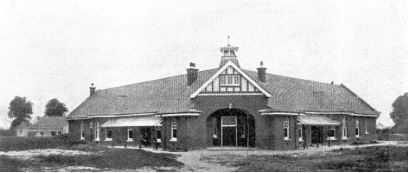
The Epsom Cluster comprised five asylums built between 1899 and 1924. The Colony opened in 1903 to cater for the “Epileptic insane of the Metropolis” and offered some new treatments only recently available and so it seems sad that they continue to label sufferers as ‘Lunatics’. Patient lived in villa’s (seen here) rather than the hospital blocks, removing some of the stigma of asylum life.
Patients contributed to the whole of the cluster by working in some capacity, in the laundry, bakery, boot shop, carpenters, dressmakers or kitchen. Those that were fitter could work in the garden or on the farm.
We find Joseph’s wife, Eliza Honey in the 1911c in the Bromley Union Workhouse/Infirmary in Kent where she is a patient, and again in the 1939 register she is a patient in the Fulham Hospital W6. Her death is registered in Fulham in October 1939 aged 96yrs.
Joseph’s son William George
Unusually for the time Joseph and Eliza only appear to have had one child who was known as William George Wood Honey, his birth and baptism are detailed above. In the 3rd quarter of 1890 he marries at St Mary the Virgin Church in Elham, Kent, (not to be confused with Eltham, Greenwich where they later lived) to Rosa Ellen Wood Castle. Rosa was born in 1870, the daughter of Benjamin Wood and Rose Martha Castle who was previously married to John Castle.
After their marriage William and Rosa lived in Selsdon, Croydon, Surrey where William was a railway signalman working for the London, Brighton and South Coast Railway earning £1.20s per week.
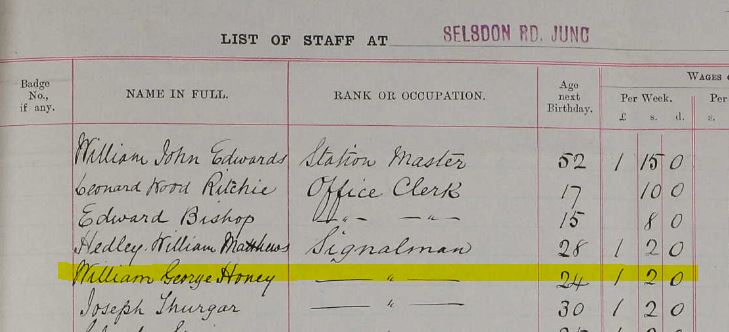
In both the 1901 and 1911c the family are living in Faversham, Kent and throughout this time William continues to work for the railways company.
Later in 1911 we find William George Wood’s death aged just 44yrs. He was buried at St John the Baptist Church, Eltham, Greenwich, London on the 25th November 1911. Unlike his parents William and Rosa had nine children who seem to use the name Honey, or Wood Honey as they chose.
- William Frederick WH 1891 – 1957.
- George Henry WH 1893 – 1910
- Beatrice Marion WH 1895 – 1987
- Jessie Rose WH 1896 – 1987
- Maude Mary WH 1898 – 1978
- Hubert Richard H 1899 – 1960
- Dorothy Ellen H 1901 – 1990
- Catherine Alice H 1905 – 1996
- John Alfred H 1907 – 1976
Authors note
Joseph’s is a sad story of it’s time; coming from a good family and having a trade he and Elizabeth could have lived well with only the one child. What caused him to drink? Did the drink, combined with the falls and resulting head traumas bring on the Epilepsy? We do not know his state of mind before he came to the Colony and sadly with the limited treatment available things could only go one way. Reading his case notes there are episodes brushed over and phrases used that we now find difficult, and we can only be glad that someone with Joseph’s problems would be treated very differently today.
